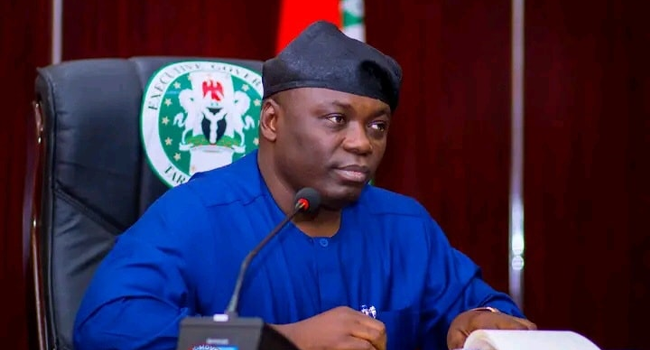“It is not beyond our power to create a world in which all children have access to a good education. Those who do not believe this have small imagination.’’
In another year, three decades would have passed since Nelson Mandela, unarguably one of the greatest leaders and statesmen of our time issued that irrefutable admonition. Taken from his autobiography, Long Walk to Freedom, it is one of his many iconic postulations in the area of education.
Now, fast forward to 2023, and read the headlines taken from some Nigerian newspapers such as ‘Why I Declared State of Emergency in Education -Gov Kefas’; ‘Gov Kefas Orders Free Tuition for Primary, Secondary School Pupils in Taraba’: and ‘Taraba Gov Slashes Varsity Tuition Fees by 50%’.
Dr. Agbu Kefas, governs Taraba State, one of the smallest states in Nigeria, with a population of 3,331,885, making it the 32nd out of the 36 states by population. But by a curious logical inversion, out of the 13.5 million out-of-school children of primary school age in Nigeria in 2021 as reported by UNESCO, Taraba State accounted for 338,973, placing it 12th on the rung.
- Kogi gov’ship: Forum of former lawmakers endorses Ododo
- US tasks Muslim, Christian leaders over HIV/AIDS discrimination
Going by the total national outlook, one could be forgiven for considering that figure as small. However, when it is realised that it represents over 10 per cent of Taraba State’s total population, that figure becomes statistically significant. Moreover, juxtaposed against Nelson Mandela’s axiomatic statement, that fraction would seem unacceptable and indefensible.
It is reassuring that, so far, the statements and actions credited to Governor Kefas align with Mandela’s position, that it is the mark of responsible leadership to treat access to basic education as the inalienable right of every child; where basic education refers to any level up to secondary school graduation.
The United States takes that for granted with the understanding that by age 18, every child should have graduated from high school and in a position to take their destinies into their hands.
But in Nigeria, despite pious pronouncements of intent and even policies aimed at domesticating the free education dictum, in practice it has been observed more in the breach as shown by the disquieting army of children who roam the streets either as beggars or street traders. The net impact is the social dislocation experienced all over the country characterised by drug addiction, crime and criminality. That these children also present a ready pool for recruitment by terror gangs proves the adage that an idle mind is the devil’s workshop. That is the ugly spectre that Kefas, through his bold interventions, is poised to redress.
For the records, Kefas inherited an educational sector that was crying for redemption. Though some improvement had been recorded before Kefas mounted the leadership stable, five months arrears of salaries of primary school teachers prior to May 29, 2023, had lowered morale so much so that during the 2023 May Day celebration, Peter Jediel, Taraba State chairman of the Nigeria Labour Congress pointedly asked Darius Ishaku who had only 28 days left in office to settle the arrears of teachers’ salaries.
Like many other states, Taraba has also suffered the problem of the discriminatory posting of teachers to schools in urban and rural areas. As usual, wives of top public officers got privileged postings, ostensibly to the urban centres where their husbands worked and resided while the less privileged who, more often than not lacked the requisite academic and professional grounding, were deployed to the rural areas. The result is that the school system is saddled with a combination of disgruntled and, in some cases, unqualified teaching staff who invariably cannot give more than their competencies or motivation can provide.
However, Kefas’ actions so far demonstrate that he possesses the strategy for exorcising the unholy trinity of poor access, acute shortage of teaching staff and dilapidated infrastructure that has all along bedeviled the education sector in the state.
Thus, one of his first major policy statements was to declare a state of emergency in basic and post-basic education in the state. The pillars of the education emergency included: free and compulsory education at the primary and secondary levels in the state; 50 per cent reduction in fees in tertiary institutions in the state, and a pledge to boost the training and welfare of teachers. In addition, Kefas capped his revolutionary measures by announcing cash incentives to members of the National Youth Service Corps (NYSC) scheme serving in Taraba State.
Under the scheme, NYSC members deployed to the state would be paid N25,000 every academic term. In addition, those serving in schools would receive an additional N10,000 monthly.
For many reasons, the huge cash incentive to corps members has the potential of being a formidable game-changer in bridging the manpower gap, particularly with the reported upsurge in school enrolment following the declaration of free education. Though it is too early to reach a conclusion, it is possible that in one fell swoop, Kefas would have found the solution to the out-of-school children crisis in Taraba State.
Again, the recent disclosure by the state Commissioner for Information, Barrister Zainab Usman, of the state government’s plan to retain corps members who distinguished themselves, is an added incentive that demonstrates clear-sightedness on the part of the Kefas administration.
Will he succeed? Only time will tell. It will depend on the Governor’s ability to get all stakeholders on board: parents, pupils, religious and traditional rulers, civil society organisations and development partners. Available evidence shows that his bold policies are already eliciting positive responses across the state. Watts and all, he has set the stage for a brighter future, where education will be accessible to all, and the spirit of unity and progress shall prevail.
Atumeyi is a doctoral student of political science at the University of Abuja

 Join Daily Trust WhatsApp Community For Quick Access To News and Happenings Around You.
Join Daily Trust WhatsApp Community For Quick Access To News and Happenings Around You.


